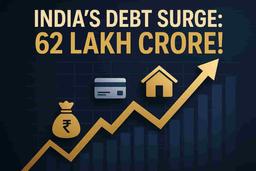India Stocks Surge: US Trade Deal Hopes & Fed Rate Cut Buzz Ignites Market Rally!
Economy
|
Updated on 12 Nov 2025, 01:41 pm
Reviewed By
Simar Singh | Whalesbook News Team
Short Description:
▶
Stocks Mentioned:
Detailed Coverage:
Indian equity benchmarks, the Sensex and Nifty, continued their upward trend for the third day in a row on Wednesday. The Sensex closed 585 points higher at 84,467, and the Nifty gained 181 points to reach 25,876, marking a 0.7% increase for both. The total market capitalization of firms listed on the Bombay Stock Exchange surged by Rs 4.75 trillion, reaching Rs 474 trillion.
The rally is largely attributed to growing optimism surrounding a potential US-India trade agreement that could slash tariffs on selected goods from approximately 50% to between 15% and 16%. This optimism, coupled with expectations that the US Federal Reserve might cut interest rates in December, significantly boosted investor sentiment.
Technology stocks were the outperformers, with the Nifty IT index jumping 2% on Wednesday and accumulating a 5% gain over three days. This sector benefited from positive signals from the US regarding skilled foreign workers, easing concerns over visa restrictions.
Additional factors contributing to the positive market mood included hopes for the resolution of the US government shutdown and strong quarterly corporate earnings. Siddhartha Khemka, Head of Research at Wealth Management, Motilal Oswal Financial Services, noted that steady Q2 earnings, positive exit poll results in Bihar indicating an NDA victory, and record Systematic Investment Plan (SIP) inflows also buoyed sentiment. He expects markets to maintain a positive bias, supported by the ongoing earnings season, trade deal progress, and improving global cues.
Technically, the Nifty faces immediate support at the 25,760–25,730 zone, with a potential decline towards 25,560 if broken. Resistance is seen at 26,000–26,030, a sustained move above which could push the index towards 26,180.
Among specific stocks, Asian Paints emerged as the top gainer on the Sensex, rising 4.5%, followed by Tech Mahindra, up 3.4%.
Foreign portfolio investors (FPIs) were net sellers, offloading shares worth Rs 1,750 crore, while domestic institutional investors (DIIs) were net buyers, injecting Rs 5,127 crore into the market.
Global brokerage firms like HSBC and Goldman Sachs have expressed a positive outlook on India. Goldman Sachs set a Nifty target of 29,000, citing India's potential to outperform emerging markets next year due to earnings revival and reasonable valuations, while also positioning India as an "AI hedge" and diversification source. HSBC's Herald van der Linde, Head of Equity Strategy for Asia-Pacific, anticipates strengthening foreign inflows into India.
Impact This news has a significant positive impact on the Indian stock market, driving broad-based gains across indices and sectors. The outlook suggests continued investor confidence and potential for further appreciation. Rating: 8/10.
Difficult Terms Explained:
Federal Reserve rate cut: The Federal Reserve (the central bank of the United States) may lower its target interest rate. This makes borrowing money cheaper, encouraging spending and investment, which can boost economic activity and stock markets.
Tariffs: Taxes imposed by a government on imported goods. Reducing tariffs makes goods cheaper and can improve trade relations.
Nifty IT index: An index that tracks the performance of the largest and most liquid Indian companies in the Information Technology sector.
US government shutdown: A situation where the US federal government ceases to operate due to a lack of approved funding. Ending a shutdown is generally seen as positive for economic stability.
Corporate earnings: The profits that companies make over a specific period. Strong earnings indicate healthy company performance and can drive stock prices up.
Systematic Investment Plan (SIP): A method of investing a fixed amount of money in mutual funds at regular intervals, regardless of market fluctuations. High SIP inflows indicate strong retail investor participation and confidence.
Exit polls: Surveys conducted by pollsters immediately after voting concludes in an election to gauge voter sentiment and predict election results.
NDA: National Democratic Alliance, a coalition of political parties in India, primarily led by the Bharatiya Janata Party.
Market breadth: A measure of how many stocks are advancing versus declining in a market. Positive market breadth (more advancing stocks) indicates broad-based strength in the market.
Foreign Portfolio Investors (FPIs): Investors who invest in securities of a country from abroad, such as stocks, bonds, and mutual funds.
Domestic Institutional Investors (DIIs): Institutional investors based in India, such as mutual funds, insurance companies, and banks, that invest in Indian securities.
AI hedge: An investment strategy that aims to protect against potential downsides in the stock market by investing in companies or assets perceived to benefit from the rise of Artificial Intelligence (AI), or by diversifying away from sectors heavily influenced by AI trends.
SEBI/Exchange Sector

BSE Ltd. Q2 Earnings EXPLODE Past Expectations! Is This The Next Big Stock Surge?

SEBI's BIG Plan to Revamp Stock Lending! Are High Costs Killing This Trading Tool? 🚀
Banking/Finance Sector

India's Trillion-Dollar Debt Wave: Consumer Loans Explode to ₹62 Lakh Crore! RBI's Bold Move Revealed!

Indian Mutual Funds Paradox: Why AMCs Push Thematic Funds While Investors Turn Cautious?

Unlock India's $990 Billion Fintech Secret: 4 Stocks Poised for Explosive Growth!

Indians Can Now Get Foreign Currency Digitally! NPCI Bharat BillPay Launches Revolutionary Forex Access for Indians








